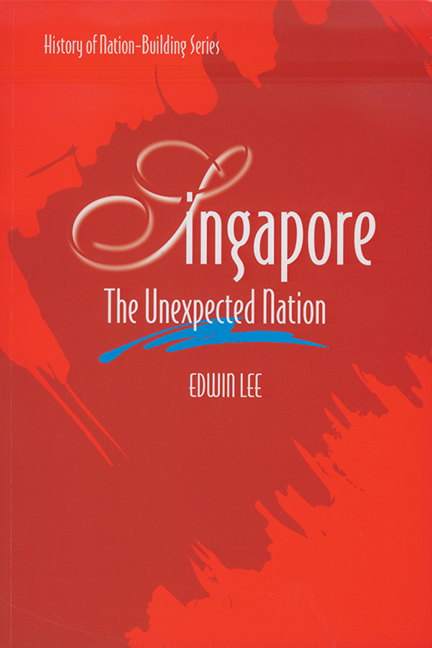Book contents
- Frontmatter
- Dedication
- Contents
- Preface
- Introduction by Wang Gungwu
- Chapter One Beginnings: From Temasek to Singapore
- Chapter Two Race, History and Nationalism
- Chapter Three Contestants and Contesting Visions
- Chapter Four The Accidental Chief Minister
- Chapter Five The Terminal Chief Minister
- Chapter Six The Embattled Prime Minister
- Chapter Seven Merger: Contesting Ownership and Principles
- Chapter Eight Terms of Disendearment
- Chapter Nine Dare to be Equal
- Chapter Ten The Way to Survive
- Chapter Eleven National Service: The Price of Independence
- Chapter Twelve Politics of Education
- Chapter Thirteen Home Ownership, National Stability and the New Middle Classes
- Chapter Fourteen University and Nation
- Chapter Fifteen Toh's Nation-Building Thrust
- Chapter Sixteen Nantah: Between Community and Nation
- Chapter Seventeen Self-Renewal: Talents for a Tough Act
- Chapter Eighteen The Consensual Prime Minister
- Chapter Nineteen Confucianism, Christianity, Chineseness
- Chapter Twenty Singapore Dreams, Singapore Dilemmas
- Chapter Twenty-One The Hyphenated Singaporean
- Chapter Twenty-Two The Unexpected Nation
- Bibliographical Note
- Index
- The Author
Chapter Eleven - National Service: The Price of Independence
Published online by Cambridge University Press: 21 October 2015
- Frontmatter
- Dedication
- Contents
- Preface
- Introduction by Wang Gungwu
- Chapter One Beginnings: From Temasek to Singapore
- Chapter Two Race, History and Nationalism
- Chapter Three Contestants and Contesting Visions
- Chapter Four The Accidental Chief Minister
- Chapter Five The Terminal Chief Minister
- Chapter Six The Embattled Prime Minister
- Chapter Seven Merger: Contesting Ownership and Principles
- Chapter Eight Terms of Disendearment
- Chapter Nine Dare to be Equal
- Chapter Ten The Way to Survive
- Chapter Eleven National Service: The Price of Independence
- Chapter Twelve Politics of Education
- Chapter Thirteen Home Ownership, National Stability and the New Middle Classes
- Chapter Fourteen University and Nation
- Chapter Fifteen Toh's Nation-Building Thrust
- Chapter Sixteen Nantah: Between Community and Nation
- Chapter Seventeen Self-Renewal: Talents for a Tough Act
- Chapter Eighteen The Consensual Prime Minister
- Chapter Nineteen Confucianism, Christianity, Chineseness
- Chapter Twenty Singapore Dreams, Singapore Dilemmas
- Chapter Twenty-One The Hyphenated Singaporean
- Chapter Twenty-Two The Unexpected Nation
- Bibliographical Note
- Index
- The Author
Summary
The overbearing attitude of a Malaysian brigadier stationed in Singapore in the aftermath of separation was worrying to Prime Minister Lee. The unduly prolonged stay of a Malaysian regiment at Camp Temasek was another worrying sign. In the short run, the British bases on the island served as a deterrent to any move to take back Singapore's independence. But they were no substitute for the defence force that the new republic must provide for itself quickly. As Dr Goh Keng Swee said, “The most dependable guarantee of our independence is a strong SAF [Singapore Armed Forces].” He added, “A strong SAF, in turn, depends on the political will to make the effort and pay the price.” The price was National Service (NS). The hardest part for the government was to get people to accept it.
As of 1965, Singapore had two infantry regiments. The government decided to form more units of regular soldiers like these, but the bulk of the army would be made up of boys and men drafted to do National Service. The first batches of National Servicemen of the new republic were called up in 1967. While recruits were plentiful, those considered to be officer material were in short supply owing to the deferment from NS then freely given to all attending university or polytechnic, or working in the civil service.
In late 1967, the Ministry of Defence (MINDEF) had to issue a “brainpower call-up”, which tapped the civil service, the two universities, the polytechnics and the vocational institute. The age group liable for NS ranged from eighteen to forty, and to fifty, in the case of officers and persons with special skills. Thus a whole lot of people and interests were affected in those early years of NS. Many were hit after the shock announcement of British withdrawal in January 1968, when MINDEF had to speed up its programme. There was a large number of command and technical positions being created, and obviously, the normal eighteen-year-old NSmen could not be appointed to them. “Accordingly, it was necessary to enlist at short notice large numbers of graduates to fill the expanded establishment.”
Then, in 1969, MINDEF decided to lengthen the full time service period of NS officers from two to three years.
- Type
- Chapter
- Information
- SingaporeThe Unexpected Nation, pp. 281 - 294Publisher: ISEAS–Yusof Ishak InstitutePrint publication year: 2008

